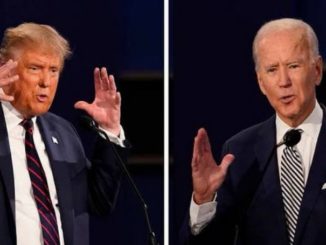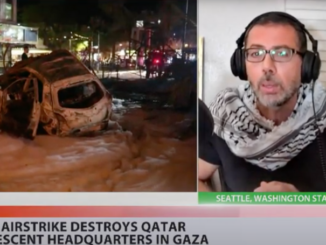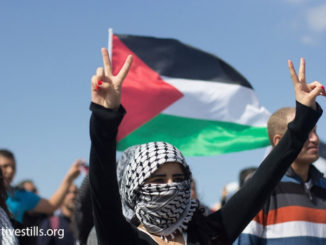
By Benay Blend
May 15 marks the 71st anniversary of the Nakba, a commemoration of the catastrophe in which Zionist forces banished 750,000-900,000 Palestinians, destroyed 531 villages, and appropriated the holdings of those who fled.
After the Six-Day War or Naksa (setback) of 1967, Israel seized the remaining territories.
In his “Forward” to Ramzy Baroud’s The Last Earth: A Palestinian Story (2018), Ilan Pappe says that Al-Nakba al Mustamera, the on-going Nakba, is a common term for the period after 1948. Moreover, he continues, this signifies that discrete chapters in the history of Palestine, such as the disaster of 1948, are not just events in the past, but rather are a part of a contemporary historical chapter.
Indeed, recent Israel’s bombing of Gaza has resulted in 25 dead and nearly 200 injured. Relying on the late Patrick Wolfe, who “adapted and applied” the settler-colonial paradigm to Palestine, Pappe explains that the project is on-going, as is Palestinian resistance to it
Resistance takes many forms: primitive rockets sent from Gaza to Israel in retaliation for whatever recent crimes committed by the Israeli state; non-violent civil disobedience, such as the year-long Great March of Return, weekly protests that sought to place the plight of refugees at the center of the liberation struggle; and finally, like Indigenous people elsewhere, Palestinians employ cultural resistance as a means to leverage their right to exist.
A national poet of a nation that exists only in his imagination, Mahmoud Darwish (1941-2008) writes that “all beautiful poetry is an act of resistance,” reflecting histories of Palestinians that highlight resistance to Occupation. Through personal stories, poetry and narrative, Palestinian voices convey an attachment to the land that serves as cultural resistance to dispossession and fragmentation.
In a July 2018 interview in Electronic Intifada, Muhammad Awadallah, 80, speaks of his displacement from his original village, located a few kilometers from the occupied West Bank village where he now lives. “I can’t forget the land. It’s always on my mind. It’s like a mother longing for her son,” he explains, recalling in detail the vegetables that his family grew on their farm.
Awadallah, 80, was speaking in the occupied West Bank village of new al-Walaja, located just a few kilometers from the original village from where he and all its other residents were displaced in 1948 by Zionist forces.
“We had lands and our hearts were open,” he recalled, speaking not only of himself but for all those in whose collective memory live stories of the past.
As Pappe notes, it is through these kinds of “almost forensic personal stories” that one can understand the impact of the Nakba not only on individuals, such as Awadallah but also on the “collective psyche” of Diasporic Palestinians as well as those still in their homeland. Their plight is at the core of Palestinian issues, and their stories are passed down through generations.
According to Maysa Abou-Yousef, environmental writing reflects a political agenda for Palestinian writers, perhaps because as more olive trees are uprooted, only words are left for preserving what was lost (“Symbolic and Intersubjective Representations in Arab American writing,” in Literature and Nature: An International Sourcebook, edited by Patrick Murphy.
For example, in Arab in Newsland (2017), Palestinian American poet Lena Khalef Tuffaha’s poem “Future Perfect” conveys memory as a tool which collapses time and unifies a scattered people.
Despite her immersion in protests against the Iraqi war, Tuffaha remembers that,
At home there was a simple answer
to “where are we from?”
The answer was always “Fa-las-teen”—
a place I hadn’t been to, an event unfolding
Writing in what Ilan Pappe calls a “homogeneous time zone,” Tuffaha creates a timeline encased within a Pandora’s box, to be opened “In Case of Emergency.”
In a poem of the same name, she goes backward through each era to present a personal as well as collective sense of trauma—all tied together by circumstances of specific time and space. Despite the Israelis’ efforts to remove those indigenous to the land from their areas of long habitation, there exists in Tuffaha’s writing a sense that recollection of painful memories can be transformed into cultural resistance.
Various years mark her father’s death, the Nakba, the Naksa, and other events all tied to the loss of land. Whatever Israel does, Tuffaha meets it with resistance embodied within land and place.
In her collection Water and Salt (2017), she speaks to her child in a poem entitled “Time Travel”:
We travel back so that you
will know who we were and who
You might have been if you
had lived here too
Finally, in the poem “Circling the Dome of the Sky,” Tuffaha sums up her mother’s definition of “home.” Reflecting a 70-year history of resistance, sumoud (resilience), and love that ties their struggle to the land, Palestinian voices surface in this poem in relation to the homeland:
What she called home was a jar of olives
shaken from the tree by hand
…
What she called home was a fig tree
against the wall…
In his introduction to the first Palestine Festival of Literature in 2008, Mahmoud Darwish said:
“Welcome to this sorrowing land, whose literary image is so much more beautiful than its present-day reality.”
For millions of Palestinians living in the Diaspora, there is no right of return. For those in Gaza and the Occupied Territories, there is no freedom to move about the land.
Nevertheless, as Ilan Pappe concludes:
“The Palestinians are victims, but they are not passive victims”.
The persistence of these narratives attests to the resilience of people who have held firmly to their right to existence.
– Benay Blend received her doctorate in American Studies from the University of New Mexico. Her scholarly works include Douglas Vakoch and Sam Mickey, Eds. (2017), “’Neither Homeland Nor Exile are Words’: ‘Situated Knowledge’ in the Works of Palestinian and Native American Writers”. She contributed this article to The Palestine Chronicle.

– Benay Blend earned her doctorate in American Studies from the University of New Mexico. Her scholarly works include Douglas Vakoch and Sam Mickey, Eds. (2017), “’Neither Homeland Nor Exile are Words’: ‘Situated Knowledge’ in the Works of Palestinian and Native American Writers”. She contributed this article to The Palestine Chronicle.







